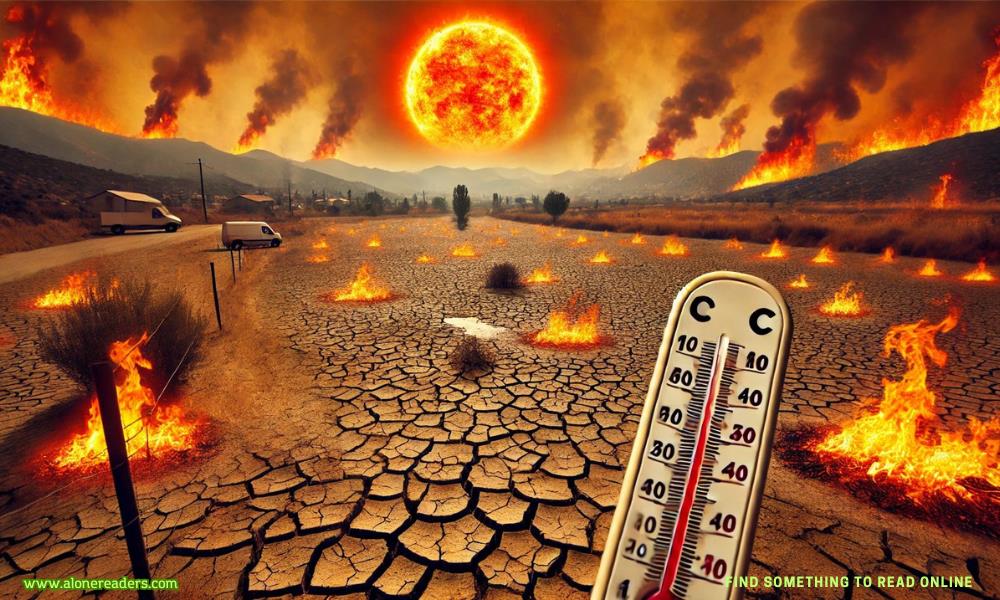
Southern Europe is currently enduring a brutal heatwave, with temperatures soaring to unprecedented levels. This extreme weather event has led to widespread wildfires and prompted health authorities to issue urgent warnings to the public. The heatwave is not only straining emergency services but also raising concerns about the long-term implications of such extreme weather patterns as climate change intensifies.
In recent weeks, countries across Southern Europe, including Italy, Greece, Spain, and Portugal, have reported temperatures well above the seasonal average. Some regions have seen the mercury climb to as high as 48°C (118°F), challenging long-standing records and putting immense pressure on public health systems.
Italy has been one of the hardest-hit countries, with cities like Rome, Florence, and Bologna experiencing their hottest days in recorded history. The Italian health ministry has issued "red alert" warnings for numerous regions, advising the elderly, children, and those with pre-existing health conditions to stay indoors and stay hydrated.
Spain, which has already faced a brutal summer, is now grappling with temperatures that have exceeded 45°C (113°F) in several areas. The relentless heat has dried up water sources, led to power outages, and sparked wildfires that are devastating large swathes of land.
The extreme heat and dry conditions have created the perfect environment for wildfires, which have erupted across Southern Europe with alarming frequency and intensity. In Greece, the island of Rhodes has been particularly hard-hit, with thousands of residents and tourists forced to evacuate as wildfires raged out of control. The fires, driven by strong winds and dry vegetation, have consumed vast areas of forest and destroyed homes and businesses.
Portugal, too, is battling its worst wildfire season in years. The Algarve region, known for its tourism, has seen fires rapidly spread, prompting evacuations and leading to significant economic losses. Firefighters are working around the clock, but the combination of extreme heat, low humidity, and unpredictable winds is making containment efforts extremely challenging.
In Spain, wildfires have been reported in several regions, including Catalonia and Andalusia. The fires have not only caused extensive damage to natural habitats but also threatened historical sites and cultural landmarks.
As the heatwave persists, public health officials are increasingly concerned about the impact on vulnerable populations. Prolonged exposure to high temperatures can lead to heat exhaustion, heatstroke, and other serious health issues. Hospitals across the region are reporting a surge in heat-related illnesses, particularly among the elderly and those with chronic health conditions.
In response, governments have implemented measures to protect the public, including opening cooling centers, distributing bottled water, and issuing guidelines on how to stay safe during the heatwave. However, the sheer scale of the heatwave and the simultaneous occurrence of wildfires are stretching resources thin.
The heatwave is also having a significant impact on daily life. In many areas, public transport systems are struggling to cope with the heat, with train services delayed or canceled due to overheated tracks. Agricultural production is suffering, with crops wilting under the relentless sun, leading to concerns about food supply shortages in the coming months.
This heatwave is a stark reminder of the growing threat posed by climate change. Scientists have long warned that rising global temperatures will lead to more frequent and severe heatwaves, and the current situation in Southern Europe appears to be a clear manifestation of these predictions.
Research indicates that the Mediterranean region is becoming a climate change hotspot, with temperatures rising faster than the global average. This trend is expected to continue, leading to longer, more intense heatwaves and an increased risk of wildfires. The current crisis is a wake-up call for governments to accelerate their efforts to mitigate climate change and adapt to its impacts.
The economic impact of the heatwave and accompanying wildfires is likely to be substantial. Southern Europe, a region heavily dependent on tourism, is seeing cancellations and disruptions at the height of the tourist season. Popular destinations like Greece's Rhodes and Portugal's Algarve are experiencing a downturn as visitors are either forced to evacuate or reconsider their travel plans.
Agriculture, another key industry in the region, is also under threat. Extreme temperatures are damaging crops, reducing yields, and leading to higher costs for irrigation. Farmers are facing an uncertain future as they grapple with the immediate effects of the heatwave and the long-term implications of a changing climate.
Environmentally, the wildfires are causing irreversible damage to ecosystems. Forests, which act as carbon sinks and help regulate the climate, are being destroyed at an alarming rate. The loss of biodiversity is another major concern, with countless species losing their habitats and being pushed closer to extinction.
As Southern Europe continues to endure this punishing heatwave, the need for action on climate change has never been more urgent. Governments must not only address the immediate crisis by providing relief to affected communities and protecting public health but also take long-term steps to reduce greenhouse gas emissions and enhance climate resilience.
Investing in renewable energy, improving water management, and strengthening emergency response systems are just a few of the measures that can help mitigate the impact of future heatwaves. International cooperation will also be essential, as climate change knows no borders and requires a coordinated global response.
In conclusion, the ongoing heatwave in Southern Europe is a stark reminder of the challenges posed by a warming planet. With temperatures breaking records, wildfires raging, and public health at risk, the situation is dire. However, it also presents an opportunity for governments, businesses, and individuals to come together and take meaningful action to combat climate change and protect our future.